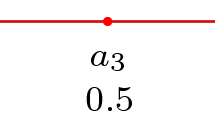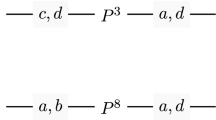Abstract
We explore the structure of locally ordinal Bayesian incentive compatible (LOBIC) random Bayesian rules (RBRs). We show that under lower contour monotonicity, for almost all prior profiles (with full Lebesgue measure), a LOBIC RBR is locally dominant strategy incentive compatible (LDSIC). We further show that for almost all prior profiles, a unanimous and LOBIC RBR on the unrestricted domain is random dictatorial, and thereby extend the result in Gibbard (Econometrica 45:665–681, 1977) for Bayesian rules. Next, we provide a sufficient condition on a domain so that for almost all prior profiles, unanimous RBRs on it are tops-only. Finally, we provide a wide range of applications of our results on single-peaked (on arbitrary graphs), hybrid, multiple single-peaked, single-dipped, single-crossing, multi-dimensional separable domains, and domains under partitioning. Since OBIC implies LOBIC by definition, all our results hold for OBIC RBRs.
Similar content being viewed by others
References
Barberà, S., Sonnenschein, H., Zhou, L.: Voting by committees. Econometrica 59, 595–609 (1991)
Border, K.C., Jordan, J.S.: Straightforward elections, unanimity and phantom voters. Rev. Econ. Stud. 50, 153–170 (1983)
Breton, M.L., Sen, A.: Separable preferences, strategyproofness, and decomposability. Econometrica 67, 605–628 (1999)
Can, B., Storcken, T.: A re-characterization of the Kemeny distance. J. Math. Econ. 79, 112–116 (2018)
Carroll, G.: When are local incentive constraints sufficient? Econometrica 80, 661–686 (2012)
Chatterji, S., Roy, S., Sadhukhan, S., Sen, A., Zeng, H.: Restricted probabilistic fixed ballot rules and hybrid domains. In: Working Paper (2020)
Chatterji, S., Sen, A.: Tops-only domains. Econ. Theor. 46, 255–282 (2011)
Chatterji, S., Zeng, H.: On random social choice functions with the tops-only property. In: Working paper (2015)
Chatterji, S., Zeng, H.: On random social choice functions with the tops-only property. Games Econom. Behav. 109, 413–435 (2018)
Cho, W.J.: Incentive properties for ordinal mechanisms. Games Econom. Behav. 95, 168–177 (2016)
d’Aspremont, C., Peleg, B.: Ordinal Bayesian incentive compatible representations of committees. Soc. Choice Welf. 5, 261–279 (1988)
Gibbard, A.: Manipulation of schemes that mix voting with chance. Econometrica 45, 665–681 (1977)
Hong, M., Kim, S.: Unanimity and local incentive compatibility in sparsely connected domains. In: Working Paper (2020)
Kemeny, J.G.: Mathematics without numbers. Daedalus 88, 577–591 (1959)
Kemeny, J.G., Snell, L.: Preference ranking: an axiomatic approach. In: Mathematical Models in the Social Sciences, pp. 9–23 (1962)
Kumar, U., Roy, S., Sen, A., Yadav, S., Zeng, H.: Local global equivalence in voting models: a characterization and applications. In: Working paper (2020)
Kumar, U., Roy, S., Sen, A., Yadav, S., Zeng, H.: Local global equivalence for unanimous social choice functions. Games Econom. Behav. 130, 299–308 (2021)
Majumdar, D., Roy, S.: Ordinally Bayesian incentive compatible probabilistic voting rules. In: Working Paper (2021)
Majumdar, D., Sen, A.: Ordinally Bayesian incentive compatible voting rules. Econometrica 72, 523–540 (2004)
Mishra, D.: Ordinal Bayesian incentive compatibility in restricted domains. J. Econ. Theory 163, 925–954 (2016)
Mishra, D., Roy, S.: Strategy-proof partitioning. Games Econom. Behav. 76, 285–300 (2012)
Peters, H., Roy, S., Sadhukhan, S.: Unanimous and Strategy-Proof Probabilistic Rules for Single-Peaked Preference Profiles on Graphs. Technical reports, Working Paper (2019)
Peters, H., Roy, S., Sadhukhan, S., Storcken, T.: An extreme point characterization of strategy-proof and unanimous probabilistic rules over binary restricted domains. J. Math. Econ. 69, 84–90 (2017)
Peters, H., Roy, S., Sen, A., Storcken, T.: Probabilistic strategy-proof rules over single-peaked domains. J. Math. Econ. 52, 123–127 (2014)
Reffgen, A.: Strategy-proof social choice on multiple and multi-dimensional single-peaked domains. J. Econ. Theory 157, 349–383 (2015)
Roy, S., Sadhukhan, S.: A unified characterization of the randomized strategy-proof rules. J. Econ. Theory 197, 105131 (2020)
Saporiti, A.: Strategy-proofness and single-crossing. Theor. Econ. 4, 127–163 (2009)
Sato, S.: A sufficient condition for the equivalence of strategy-proofness and nonmanipulability by preferences adjacent to the sincere one. J. Econ. Theory 148, 259–278 (2013)
Sen, A.: The impossibility of a Paretian liberal. J. Polit. Econ. 78, 152–157 (1970)
Wriglesworth, J.L.: Libertarian conflicts in social choice. Cambridge University Press, Cambridge (1985)
Author information
Authors and Affiliations
Corresponding author
Additional information
Publisher's Note
Springer Nature remains neutral with regard to jurisdictional claims in published maps and institutional affiliations.
The authors would like to thank Arunava Sen and Debasis Mishra for their invaluable suggestions. The authors are also grateful to two anonymous referees and the editor for their helpful comments.
Rights and permissions
Springer Nature or its licensor holds exclusive rights to this article under a publishing agreement with the author(s) or other rightsholder(s); author self-archiving of the accepted manuscript version of this article is solely governed by the terms of such publishing agreement and applicable law.
About this article
Cite this article
Karmokar, M., Roy, S. The structure of (local) ordinal Bayesian incentive compatible random rules. Econ Theory 76, 111–152 (2023). https://doi.org/10.1007/s00199-022-01449-x
Received:
Accepted:
Published:
Issue Date:
DOI: https://doi.org/10.1007/s00199-022-01449-x
Keywords
- Random Bayesian rules
- Random social choice functions
- (Local) ordinal Bayesian incentive compatibility
- (Local) dominant strategy incentive compatibility




